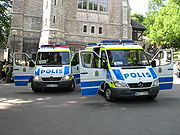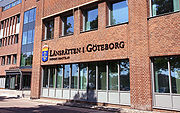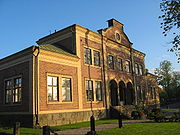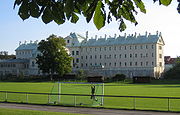
Judicial system of Sweden
Encyclopedia
The judicial system of Sweden consists of the law
of Sweden
and a number of government agencies
tasked with upholding security and rule of law within the country. The activities of these agencies include police
and law enforcement
, prosecution, court
s, and prison
s and other correctional service
s.
 Sweden has a penal law system and a civil law
Sweden has a penal law system and a civil law
system
with laws created by the Parliament of Sweden
. However, Sweden also has an extensive system of "droit administratif".
 The main body for law enforcement in Sweden is the Swedish Police Service
The main body for law enforcement in Sweden is the Swedish Police Service
(Polisen). The entire police service is under the national government; since January 1, 1965, there is no municipal police in Sweden.
.
 General courts:
General courts:
 General administrative courts:
General administrative courts:
 There are also a number of special courts, which will hear a narrower set of cases, as set down by legislation. While independent in their rulings, some of these courts are operated as divisions within courts of the general or general administrative courts. The special courts usually have a one-tier or two-tier system.
There are also a number of special courts, which will hear a narrower set of cases, as set down by legislation. While independent in their rulings, some of these courts are operated as divisions within courts of the general or general administrative courts. The special courts usually have a one-tier or two-tier system.
A number of tribunals (nämnder) are also very similar to special courts in the way they operate:
Other examples of tribunals (nämnder):
The district coursts (tingsrätt) are the instances to appeal against certain resolutions by authorities like Bolagsverket, Överförmyndare, Kronofogdemyndigheten, Lantmäteriet and the police (Polisen). Likewise an administrative court (förvaltningsrätt) can overthrow a taxation made by the tax authorities (Skatteverket).
acts as prosecutor.) In court, the prosecutor is not necessarily in an adversarial relationship to the defendant, but is under an obligation to investigate and present information which is to the advantage of the defendant as well as to his or her disadvantage. He is not a member of the bench, nor does he participate in the private deliberations of the court.
The prosecutor is also the only public official who can decide to appeal cases to courts of appeal. (As well as the defence, victims, their representatives and other parties to the case (målsäganden) can also appeal.) When a case has been decided by a court of appeal, the right to appeal to the Supreme Court
passes from the prosecutor of the individual case to the Prosecutor General (Riksåklagaren).
s (nämndemän, sometimes also called lay assessor
s) serve as part of the bench in many types of cases, including all criminal cases but virtually no civil cases. The entire bench, lay judges and professional judge(s) alike, are responsible for the entire verdict of the court. In first-tier courts, the lay judges are always in the majority, whereas the professional judges are in the majority in the second-tier courts.
The use of lay judges differs from many jurisdictions with jury
systems. Lay judges are short-term (in years), politically-appointed, are usually politicians, non-profressional attorneys, and act as triers of fact
along with professional judges, while juries are usually chosen from the community at large, sit only for a specific trial, and have the sole power of deciding guilt.
Lay judges are usually politicians from the local authority from which they are appointed, appointed in proportion to political party representation at the last local elections. They are appointed by local political assemblies for a period of service at a certain court. The municipal assemblies
appoint lay judges for the district courts and the county council
appoint lay judges for the county administrative courts and the appellate courts. Typically, a lay judge will serve one day per month in court during his or her tenure. The use of lay judges in Sweden goes back to Medieval times.
 The Prison and Probation Service is the government agency handling prisons in Sweden.
The Prison and Probation Service is the government agency handling prisons in Sweden.
Law
Law is a system of rules and guidelines which are enforced through social institutions to govern behavior, wherever possible. It shapes politics, economics and society in numerous ways and serves as a social mediator of relations between people. Contract law regulates everything from buying a bus...
of Sweden
Sweden
Sweden , officially the Kingdom of Sweden , is a Nordic country on the Scandinavian Peninsula in Northern Europe. Sweden borders with Norway and Finland and is connected to Denmark by a bridge-tunnel across the Öresund....
and a number of government agencies
Government agencies in Sweden
The Government agencies in Sweden are state controlled organizations who act independently to carry out the policies of the Swedish Government. The Government Ministries are relatively small and merely policy-making organizations, allowed to control agencies by policy decisions but not by direct...
tasked with upholding security and rule of law within the country. The activities of these agencies include police
Police
The police is a personification of the state designated to put in practice the enforced law, protect property and reduce civil disorder in civilian matters. Their powers include the legitimized use of force...
and law enforcement
Law enforcement agency
In North American English, a law enforcement agency is a government agency responsible for the enforcement of the laws.Outside North America, such organizations are called police services. In North America, some of these services are called police while others have other names In North American...
, prosecution, court
Court
A court is a form of tribunal, often a governmental institution, with the authority to adjudicate legal disputes between parties and carry out the administration of justice in civil, criminal, and administrative matters in accordance with the rule of law...
s, and prison
Prison
A prison is a place in which people are physically confined and, usually, deprived of a range of personal freedoms. Imprisonment or incarceration is a legal penalty that may be imposed by the state for the commission of a crime...
s and other correctional service
Corrections
In criminal justice, particularly in North America, correction, corrections, and correctional, are umbrella terms describing a variety of functions typically carried out by government agencies and involving the punishment, treatment, and supervision of persons who have been convicted of crimes....
s.

Civil law (legal system)
Civil law is a legal system inspired by Roman law and whose primary feature is that laws are codified into collections, as compared to common law systems that gives great precedential weight to common law on the principle that it is unfair to treat similar facts differently on different...
system
Legal systems of the world
The legal systems of the world today are generally based on one of three basic systems: civil law, common law, and religious law – or combinations of these...
with laws created by the Parliament of Sweden
Parliament of Sweden
The Riksdag is the national legislative assembly of Sweden. The riksdag is a unicameral assembly with 349 members , who are elected on a proportional basis to serve fixed terms of four years...
. However, Sweden also has an extensive system of "droit administratif".
Law enforcement

Swedish Police Service
The Swedish Police Service is a collection of Government agencies concerned with police matters in Sweden. The Swedish Police Service consists of 28,500 employees of which 39 per cent are women. The staff consists of 20,000 police officers of which 25 per cent are women and 8,500 civilian staff of...
(Polisen). The entire police service is under the national government; since January 1, 1965, there is no municipal police in Sweden.
Courts
The courts are divided into two parallel and separate systems, general courts (allmänna domstolar) for criminal and civil cases, and general administrative courts (allmänna förvaltningsdomstolar) for administrative cases. Each of these systems has three tiers, where the top tier court of the respective system typically only will hear cases that may become precedentPrecedent
In common law legal systems, a precedent or authority is a principle or rule established in a legal case that a court or other judicial body may apply when deciding subsequent cases with similar issues or facts...
.

- The Supreme Court of SwedenSupreme Court of SwedenThe Supreme Court of Sweden is the supreme court and the third and final instance in all civil and criminal cases in Sweden. Before a case can be decided by the Supreme Court, leave to appeal must be obtained, and with few exceptions, leave to appeal can be granted only when the case is of...
(Högsta Domstolen) - 6 courts of appeals (hovrättHovrättThe Hovrätt was the highest judicial body in Sweden until Gustav III of Sweden founded the Supreme Court of Sweden in 1789. The first hovrätt, Svea hovrätt, was founded in 1614...
er) - 53 district courts (tingsrättTingsrättTingsrätt , käräjäoikeus or tingrett is a term used for district courts in Sweden, Finland and Norway...
er)

- The Supreme Administrative Court of SwedenSupreme Administrative Court of SwedenThe Supreme Administrative Court of Sweden is the supreme court and the third and final tier for administrative court cases in Sweden, and is located in Stockholm...
(Högsta förvaltningsdomstolen) - 4 administrative courts of appeals (kammarrätter)
- 12 administrative courts (förvaltningsrätter)

- Land and environmental courts (mark- och miljödomstolar): five first-tier courts (in five district courts) and one second-tier court (in one court of appeals, Svea hovrätt)
- Migration courts (migrationsdomstolar): three first-tier courts (in three county administrative courts) and one second-tier court (in one administrative court of appeals, in StockholmStockholmStockholm is the capital and the largest city of Sweden and constitutes the most populated urban area in Scandinavia. Stockholm is the most populous city in Sweden, with a population of 851,155 in the municipality , 1.37 million in the urban area , and around 2.1 million in the metropolitan area...
) - The Labour Court (Arbetsdomstolen)
- The Market Court (Marknadsdomstolen)
- The Court of Patent Appeals (Patentbesvärsrätten)
- The Defense Intelligence Court (Försvarsunderrättelsedomstolen)
A number of tribunals (nämnder) are also very similar to special courts in the way they operate:
- Regional rent tribunals (hyresnämnder), of which there are eight, within district courts.
- Regional tenancy tribunals (arrendenämnder), of which there are eight, in the same locations as regional rent tribunals.
Other examples of tribunals (nämnder):
- The tribunal for traffic injuries (Trafikskadenämnden) in Stockholm. If the parties don't want to accept its recommendation, the case is appealed in the district court (tingsrätt). Other insurance matters have their own tribunals: Ansvarsförsäkringens Personskadenämnd, Ombudskostnadsnämnden, Personförsäkringsnämnden and Nämnden för rättsskyddsfrågor.
- The National Board for Consumer Disputes (Allmänna Reklamationsnämnden) pronounces recommendation verdicts, but without imposing anything, yet are these normally respected.
The district coursts (tingsrätt) are the instances to appeal against certain resolutions by authorities like Bolagsverket, Överförmyndare, Kronofogdemyndigheten, Lantmäteriet and the police (Polisen). Likewise an administrative court (förvaltningsrätt) can overthrow a taxation made by the tax authorities (Skatteverket).
Prosecution
Swedish prosecutors are lawyers who are employed by the Swedish Prosecution Authority (Åklagarmyndigheten) and who direct the work of the police in cases concerning severe criminality. In all criminal cases, the prosecutors make decisions concerning arrests and charges on behalf of the public, and are the only public officials who can make such decisions - there is a possibility, rarely used, for private individuals to present a private prosecution (enskilt åtal) as well. (The exception is cases concerning crimes against the freedom of the press, for which the Chancellor of JusticeChancellor of Justice
In some countries, the Chancellor of Justice is a government official responsible for supervising the lawfulness of government actions. The Chancellor does not have the power to strike down laws In some countries, the Chancellor of Justice is a government official responsible for supervising the...
acts as prosecutor.) In court, the prosecutor is not necessarily in an adversarial relationship to the defendant, but is under an obligation to investigate and present information which is to the advantage of the defendant as well as to his or her disadvantage. He is not a member of the bench, nor does he participate in the private deliberations of the court.
The prosecutor is also the only public official who can decide to appeal cases to courts of appeal. (As well as the defence, victims, their representatives and other parties to the case (målsäganden) can also appeal.) When a case has been decided by a court of appeal, the right to appeal to the Supreme Court
Supreme Court of Sweden
The Supreme Court of Sweden is the supreme court and the third and final instance in all civil and criminal cases in Sweden. Before a case can be decided by the Supreme Court, leave to appeal must be obtained, and with few exceptions, leave to appeal can be granted only when the case is of...
passes from the prosecutor of the individual case to the Prosecutor General (Riksåklagaren).
Lay judges
In first- and second-tier Swedish courts, both in the general and the administrative hierarchy, lay judgeLay judge
A lay judge is a person assisting a judge in a trial. Lay judges are used in some civil law jurisdictions, such as Germany, Sweden and Finland. Japan began implementing a new lay judge system in 2009....
s (nämndemän, sometimes also called lay assessor
Lay assessor
Lay assessors are used by the government of the United Kingdom to evaluate the quality of service provided by government agencies to the public and citizens of the United Kingdom....
s) serve as part of the bench in many types of cases, including all criminal cases but virtually no civil cases. The entire bench, lay judges and professional judge(s) alike, are responsible for the entire verdict of the court. In first-tier courts, the lay judges are always in the majority, whereas the professional judges are in the majority in the second-tier courts.
The use of lay judges differs from many jurisdictions with jury
Jury
A jury is a sworn body of people convened to render an impartial verdict officially submitted to them by a court, or to set a penalty or judgment. Modern juries tend to be found in courts to ascertain the guilt, or lack thereof, in a crime. In Anglophone jurisdictions, the verdict may be guilty,...
systems. Lay judges are short-term (in years), politically-appointed, are usually politicians, non-profressional attorneys, and act as triers of fact
Trier of fact
A trier of fact is a person, or group of persons, who determines facts in a legal proceeding, usually a trial. To determine a fact is to decide, from the evidence, whether something existed or some event occurred.-Juries:...
along with professional judges, while juries are usually chosen from the community at large, sit only for a specific trial, and have the sole power of deciding guilt.
Lay judges are usually politicians from the local authority from which they are appointed, appointed in proportion to political party representation at the last local elections. They are appointed by local political assemblies for a period of service at a certain court. The municipal assemblies
Municipal assembly (Sweden)
A municipal assembly is the decision-making body governing each of the 290 municipalities of Sweden. Though the Swedish Local Government Act uses the term "municipal assembly" in the English translation of the Act, "municipal council" and even "city council" are used as well, even in official...
appoint lay judges for the district courts and the county council
County Councils of Sweden
A county council, or landsting, is an elected assembly of a county in Sweden. A county council is a political entity, elected by the county electorate and typically its main responsibilities lie within the public health care system. In each county there is also a county administrative board which...
appoint lay judges for the county administrative courts and the appellate courts. Typically, a lay judge will serve one day per month in court during his or her tenure. The use of lay judges in Sweden goes back to Medieval times.
Juries
The only type of case when a jury is used is freedom of expression cases, when a 9-member jury provides a pre-screening before the case is ruled by the bench, using the same procedure as for other cases. Thus, the bench can still throw out a case after the jury has ruled on it, but can never convict if the jury acquits.Prisons and corrections


